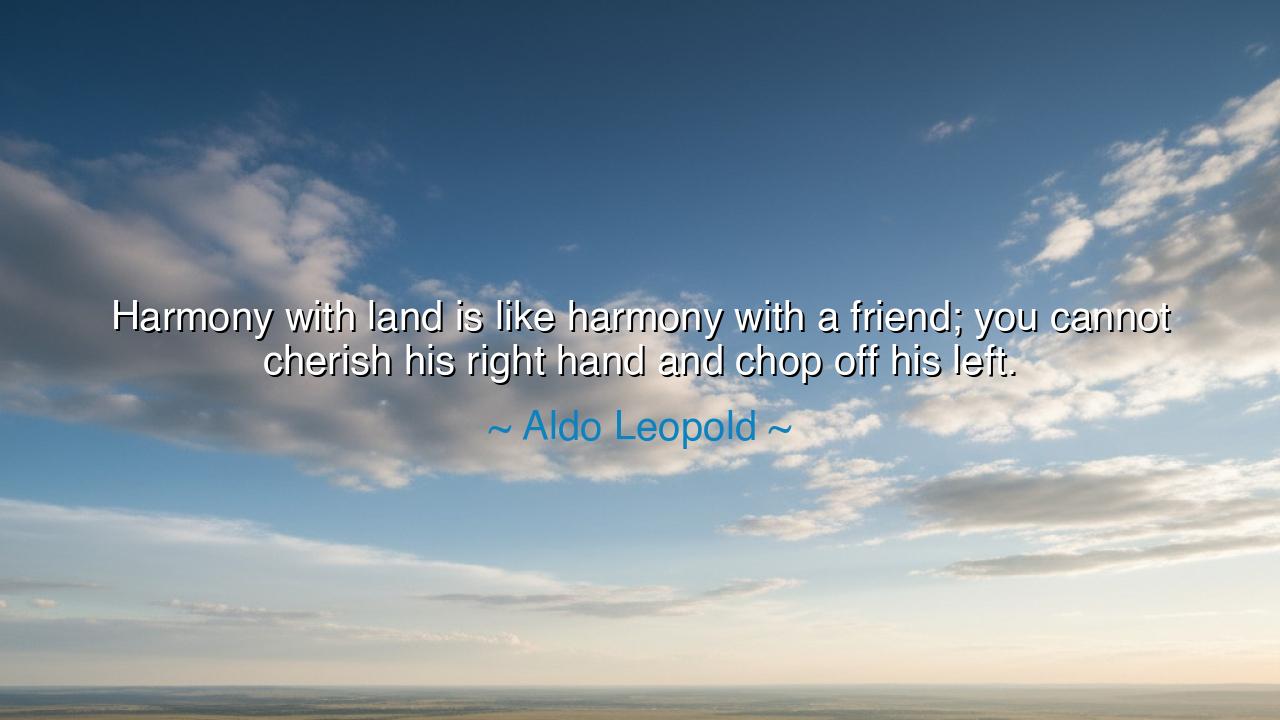
Harmony with land is like harmony with a friend; you cannot
Harmony with land is like harmony with a friend; you cannot cherish his right hand and chop off his left.






When Aldo Leopold wrote, “Harmony with land is like harmony with a friend; you cannot cherish his right hand and chop off his left,” he was not merely offering a metaphor—he was offering a commandment. His words are a lament for the broken bond between humankind and the earth, a bond once sacred and whole, now torn by greed and carelessness. In this single line, he speaks the truth of both nature and the human heart: that harmony cannot exist where there is exploitation, and love cannot coexist with harm. To live in harmony with the land, we must learn to cherish it wholly, not in parts, not for its convenience, but for its living unity.
The origin of this wisdom comes from Leopold’s life as both a scientist and a philosopher of the wild. He was no dreamer distant from reality—he was a forester, an ecologist, and a man who walked the soil he spoke of. Through years of working the land, of seeing the forests fall and the rivers run dry, he came to understand that the land is not a commodity, but a community of which we are members. His book, A Sand County Almanac, from which these words arise, is both hymn and warning—a plea for mankind to see that to destroy one part of nature while admiring another is as senseless as loving a friend while wounding him. The land is a living whole, and when we strike any part of it, we strike the whole, including ourselves.
To cherish the right hand and chop off the left—what does this mean? It is the folly of those who praise the beauty of forests but drain the rivers that feed them, who marvel at the mountains while poisoning the valleys below, who love the song of birds but burn the trees that shelter them. Humanity has long loved the beauty of nature while ignoring its wholeness. We celebrate the sunrise, but pollute the air through which it shines. We speak of the bounty of the earth, yet exhaust the soil that grants it. This, Leopold teaches, is not love—it is betrayal masked as admiration.
Consider the story of the American Dust Bowl in the 1930s—a tragedy born from ignorance of this very truth. Farmers, seeking prosperity, plowed the grasslands of the Great Plains, turning them into fields of wheat. They cherished the harvest, the “right hand” of the land’s bounty, but they forgot the “left hand”—the grasses whose roots held the soil in place. When the rains ceased and the winds came, the earth itself rose in clouds of dust, darkening the skies and driving families from their homes. What they had cherished was destroyed because they had failed to cherish the whole. In trying to master the land, they had broken their friendship with it—and the land, in its silent way, reminded them of the cost.
Harmony with the land is not passive admiration; it is an active relationship. To live in harmony means to respect the balance of all things—the predator and the prey, the forest and the field, the mountain and the river. Just as a friendship requires understanding and care, so too does our relationship with the earth. We cannot take endlessly and expect the bond to hold. We cannot heal only the parts we find beautiful and ignore the parts we have scarred. True harmony requires humility—to listen to the land, to learn its rhythms, and to act not as conquerors, but as companions.
Leopold’s words call upon us to see the land as a living friend—one with its own heart, its own spirit, its own needs. When the forest burns, it is not a distant loss; it is the suffering of a companion. When the rivers die, it is not merely a tragedy of nature—it is a wound upon the bond that sustains us. To cherish the land fully is to honor its wholeness, to recognize that its left hand—the unseen, the inconvenient, the untamed—is as precious as its right. This is the ethic of stewardship, not ownership; of reverence, not control.
So let us take from Leopold’s teaching this enduring lesson: to live rightly, we must love wholly. The land is not divided, and neither should our hearts be. Plant trees where we have felled them. Protect rivers as we do our homes. Walk gently upon the earth, remembering that each step is upon the skin of our oldest friend. In every act—whether we farm, build, or consume—let us ask, “Does this wound the left hand while I cherish the right?” For only when our answer is no will we truly live in harmony.
And thus, as the ancients revered the earth as mother and teacher, so must we once again. For to live in harmony with the land is to live in harmony with ourselves. When we learn to love the whole—both the beauty and the burden—we will find not only the salvation of nature, but the renewal of the human spirit. Harmony, then, is not an ideal, but a way of being—a covenant between the earth and those wise enough to call it friend.






AAdministratorAdministrator
Welcome, honored guests. Please leave a comment, we will respond soon